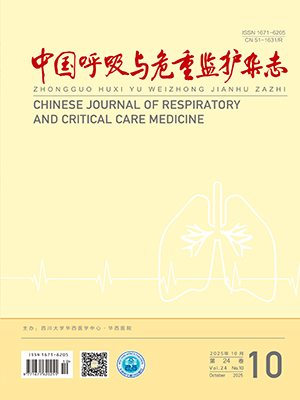Objective To investigate whether Chlamydia pneumoniae alters the expression of TLR2 mRNA and p38 MAPK mRNA in mice with Chlamydia pneumoniae infection in TLR2-p38 MAPK-dependent pathway, subsequently leading to the release of cytokines.
Methods Seventy-two male C3H/HeJmice were randomly divided into three groups as follow: a normal control group, a C. pneumoniae-inoculated group, and a C. pneumoniae-inoculated with SB203580 treatment group. The mice in the three groups were sacrificed on 1st, 4th, 7th, 14th day separately, and lung tissues were sampled for measurement. The expression changes of TLR2 mRNA and p38 MAPK mRNA in the mice lung tissue were measured by semi-quantitative RT-PCR. The concentrations of TNF-αin the lung tissue were measured by ELISA.
Results Compared with those in the normal group, the expressions of TLR2 mRNA and p38MAPK mRNA in the lung tissue increased quickly after C. pneumoniae infection, which was especially obvious on day 4 and on day 7, the expression level of TLR2 mRNA on day 7 was markedly higher than that of the normal group [ ( 7. 24 ±1. 78) mg/L vs.( 0. 64 ±0. 14) mg/L, P lt;0. 05] ; The expression level of p38 MAPK mRNA on day 4 was markedly higher than that of the normal group [ ( 9. 267 ±1. 813) mg/L vs. ( 3. 734 ±0. 946) mg/L, P lt;0. 05] . After 14 days, C. pneumoniae infection of mice was attenuated, the concentration of TNF-α in the lung tissue increased, and was clearly higher than that of the normal control group, peaking on day 4 [ ( 77. 29 ±9. 66) pg/mg] . Treatment with SB203580 could effectively inhibit TLR2 mRNA and p38 MAPK mRNA expression in lung, which was especially obvious on day 4 and on day 7. The expression level of TLR2 mRNA on day 7 was ( 0. 269 ±0. 09) mg/L, and the expression level of p38 MAPK mRNA on day 7 [ ( 0. 002 ±0. 001) mg/L] was even more obviously attenuated, the concentration of TNF-α in the lung tissue markedly decreased when compared with that in the infected group, and its concentration on day 4 [ ( 25. 76 ±3. 49) pg/mg] lowered more clearly.
Conclusions The alteration of TLR2-p38 MAPKdependent signal pathway in lungs is closely connected with Chlamydia pneumoniae infection. SB203580 treatment can effectively controll the elevation of TLR2 mRNA and p38 MAPK mRNA expressions in lung. It can effectively control the TLR2-MAPK signal transduction pathway.
Citation: SHI Yi,DONG Jing,YIN Jie,SHEN Ping,ZHU Meiying.. The Expression and Significance of Toll-Like Receptor2-p38 MAPK Pathway in Chlamydia Pneumoniae Infection of Mice. Chinese Journal of Respiratory and Critical Care Medicine, 2011, 10(5): 432-436. doi: Copy
Copyright © the editorial department of Chinese Journal of Respiratory and Critical Care Medicine of West China Medical Publisher. All rights reserved




